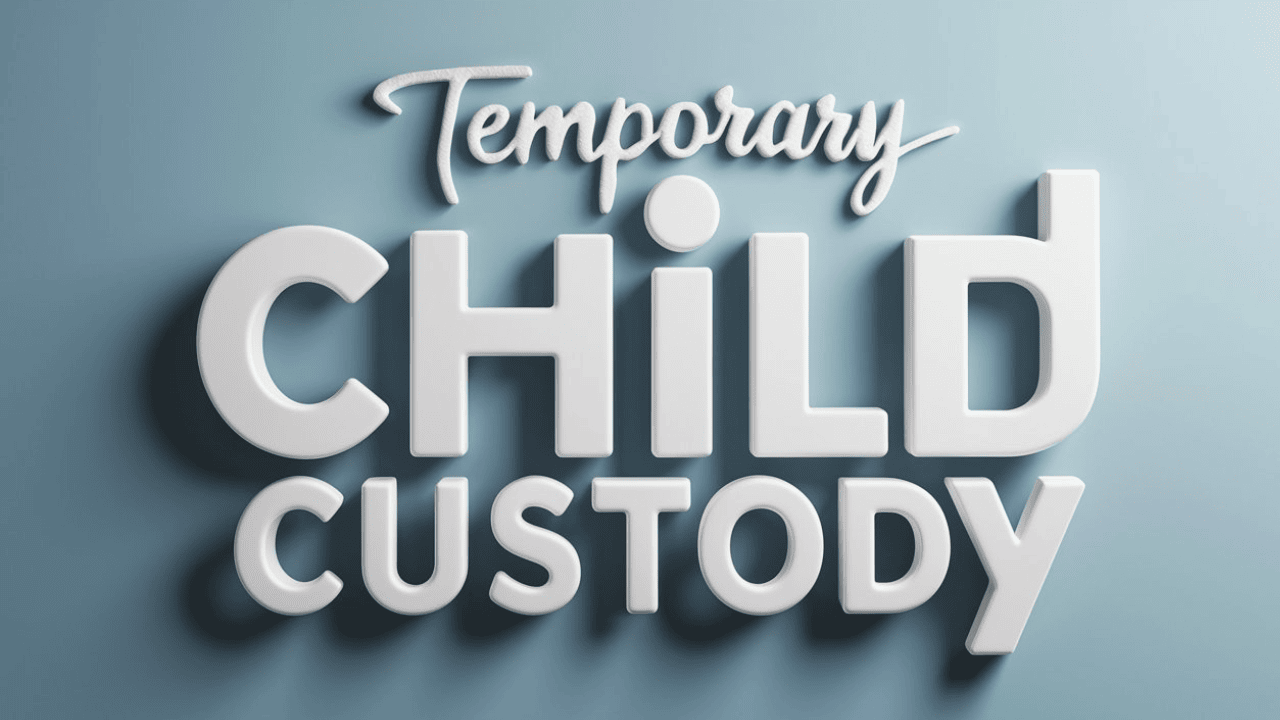
Navigating Temporary Child Custody Orders in North Carolina
In the case of Lawrence v. Lawrence, the North Carolina Court of Appeals examined the complexities of transitioning from temporary to permanent custody orders. This June 18, 2024, case highlights important legal principles that impact parents navigating child custody arrangements and the need for timely action and the helpfulness of clear, unambiguous language setting forth that an agreement is without prejudice.
Case Background
The parents of a minor child were embroiled in a custody dispute over their daughter.
After their separation in November 2018, they agreed on a temporary custody arrangement in January 2019, which was later modified in April 2019.
The Plaintiff sought a permanent custody arrangement, while the trial court ruled that the temporary orders had become permanent due to the passage of time without a final hearing.
The Plaintiff appealed this decision.
The NC Court of Appeals ruled:
- It is clear from the plain language of the Consent Order(s) that the agreement was entered without prejudice despite the failure to specifically include that term of art
- The trial Court’s ruling that the Consent Order and the Modified Consent Order transitioned to permanent Custody Order “by acquiescence” was in error
- The record “does not support” the trial Court’s conclusion that the Plaintiff failed to act in a timely fashion
- The trial Court’s conclusion that neither parent filed requests for no less than 18 months is “unsupported by the evidence”
- The relevant time period starts when the party requests a matter be set on for hearing, not when the hearing itself is held
Legal Principles and Court’s Reasoning
Temporary vs. Permanent Custody Orders
Temporary custody orders are intended to provide interim arrangements until a final custody decision is made.
These orders do not determine the parties’ ultimate rights and are usually short-term, designed to last only until a further court hearing.
Permanent custody orders, on the other hand, establish long-term arrangements that remain in effect until modified by the Court (the Judge).
Such orders can only be changed if a substantial change in circumstances affects the child’s well-being.
Determining Permanency: The Senner Test
The court applied the Senner test to determine whether an order is temporary or permanent. According to this test, an order is considered temporary if:
- It is entered without prejudice to either party.
- It states a clear and specific reconvening time within a reasonably brief interval.
- It does not determine all issues.
If an order fails to meet any of these criteria, the child custody order could be deemed permanent.
The trial Court in this case had to decide if the temporary orders issued in January and April 2019 had become permanent.
Operation of Time and Acquiescence
A temporary order can become permanent if the parties do not seek a final hearing within a reasonable time.
The focus is on whether a party has actively pursued a hearing.
In this case, the trial Court ruled that the temporary orders had become permanent by acquiescence, stating that neither party sought a hearing within 18 months.
When is the best time to get Divorced?
Court of Appeals Decision
The North Carolina Court of Appeals disagreed with the trial Court’s ruling, finding that the Plaintiff had indeed made reasonable efforts to seek a final hearing. The NC Court of Appeals noted that:
- The Plaintiff filed multiple calendar requests and notices for hearings on custody within nine months of the initial temporary order.
- The delays were largely due to external factors, such as the COVID-19 pandemic and attorney withdrawals, rather than any lack of action by the Plaintiff.
Based on these findings, the Court of Appeals reversed the trial court’s decision and remanded the case for further hearings to establish a permanent custody arrangement.
Implications for Parents
This case underscores the importance of clearly setting forth the temporary nature of initial custody orders and the need for timely legal action to protect and preserve legal rights.
Parents involved in custody disputes should actively pursue final hearings and ensure that any delays are documented and justified, instead of relying on a temporary child custody order. 
As a practical matter, including language within a Temporary Child Custody agreement setting forth the parties are not prejudiced is generally advisable but not necessarily dispositive.
It is helpful for the parties to make clear in the Consent Order that it is, in fact, a temporary custody arrangement that will be entered “without prejudice to the rights of either party.”
Indeed, even absent such “without prejudice” language, the Order may be deemed temporary if it is clear from the plain language within the Order that such Order will be entered without the loss of rights to either or both parties.
1. What is a temporary child custody order in North Carolina?
A temporary custody order provides a short-term arrangement for child custody while awaiting a final decision from the court. These orders establish immediate custody and visitation schedules to ensure stability and routine for the child during the legal process. Temporary custody orders help maintain the child’s well-being by outlining where the child will live and how much time they will spend with each parent until a permanent custody arrangement is determined.
2. How does a temporary order become permanent?
A temporary order can become permanent in North Carolina if it does not meet the criteria established by the Senner test, which includes:
- It is entered without prejudice to either party.
- It states a clear and specific reconvening time within a reasonably brief interval.
- It does not determine all issues.
If these criteria are not met, and neither party seeks a final hearing within a reasonable time, the court may deem the temporary order permanent by default. The court considers whether the parties have actively pursued a hearing and whether there have been justified delays. If a significant period passes without action, the temporary order may become permanent in certain circumstances. Thereafter, seeking a modification of child custody in North Carolina requires a substantial change in conditions.
That’s one reason it makes sense to consult with a family law attorney about the specific aspects of your legal matter. If you have a child custody matter in Charlotte, please call now to discuss the firm’s availability for legal representation and the costs associated with retaining our divorce lawyers in Mecklenburg County. Call: 704-342-4357
3. What is considered a reasonable time to seek a final hearing?
The definition of a “reasonable time” can vary depending on the circumstances. Generally, courts expect parties to seek a final hearing in a timely fashion. Factors like court availability, legal counsel changes, and external events like the COVID-19 pandemic can influence what is considered reasonable. The Court may also consider whether the parties have been actively engaged in negotiations and attempting to resolve child custody issues through means other than litigation.
4. Can a permanent custody order in North Carolina be modified?
Yes, a permanent custody order can be modified, but it generally requires a substantial change in circumstances that affects the child’s well-being. This could include changes in the child’s needs, a parent’s relocation, or significant changes in a parent’s ability to care for the child. The requesting party must provide evidence to support the need for modification.
5. What should I do if a child custody order is not working for my family?
If a temporary child custody order is not meeting your family’s needs, you should seek legal advice to discuss possible modifications. It is important to document any issues with the co-parent and communicate with your attorney about the most appropriate course of action and the best interests of your child. If the court is tasked with the responsibility of determining custody, it must ensure the child’s best interests are met.
6. How does collaborative divorce work in Charlotte?
Collaborative divorce is a process where both parties and their attorneys work together to negotiate a settlement without the intervention of a family court judge. This approach focuses on cooperation and communication, allowing the divorcing couple to resolve various issues amicably.
In a collaborative divorce, the couple works with their attorneys and may also involve other professionals, such as financial advisors or child specialists, to address and resolve key issues including:
- Equitable Distribution: The fair division of marital assets and debts.
- Child Custody: Determining where the children will live and how parenting time will be shared.
- Child Support: Establishing financial support for the children’s needs.
- Alimony: Deciding on financial support for one spouse post-divorce.
The goal of collaborative divorce is to create a mutually agreeable settlement that meets the needs of both parties and their children, fostering a more positive and respectful post-divorce relationship. Once an agreement is reached, it should be reviewed and approved by the court to become legally binding. This method often reduces the emotional and financial stress associated with traditional divorce litigation.
7. How do mediation and collaborative divorce impact custody decisions?
Both mediation and collaborative divorce can be effective methods for resolving custody disputes without prolonged court proceedings. During mediation, both parties work with a neutral third party to reach an agreement. Similarly, in a collaborative divorce, both parties and their attorneys work together to negotiate a settlement. If an agreement is reached in either process, it should be reviewed and approved by the court to become legally binding. Both approaches provide a less adversarial and more cooperative way to address custody arrangements, promoting a positive outcome for all involved.
8. What role does the child’s preference play in custody decisions?
The child’s preference can be a factor in custody decisions, especially if the child is older and capable of expressing a reasoned preference. Courts will consider the child’s wishes alongside other factors, such as each parent’s ability to meet the child’s needs and the overall stability of the proposed arrangements. The child’s best interests remain the primary consideration.
9. What are the key factors in determining custody arrangements?
Courts consider various factors when determining custody arrangements, including the child’s best interests, each parent’s ability to provide care, the child’s relationship with each parent, and the child’s stability and continuity of care. The goal is to create a custody arrangement that supports the child’s well-being and development.
10. How can I ensure a smooth transition from temporary to permanent custody?
To ensure a smooth transition from temporary to permanent custody, maintain active communication with your attorney, attend all court hearings, and comply with court orders. Document your involvement and efforts to provide a stable environment for the child. Seeking a timely final hearing and being prepared can help facilitate a smooth transition.
11. What if both parties agree on custody changes?
If both parties agree on custody changes, they may be able to submit the modified agreement to the court for approval. This ensures the changes are legally binding and enforceable. It is a good idea to work with legal counsel to ensure the agreement meets legal standards and addresses all relevant issues.
By understanding the legal principles and processes involved in child custody cases, parents can navigate the system more effectively and make informed decisions that prioritize their child’s well-being.
This blog post aims to provide a clear and comprehensive understanding of the legal principles involved in the Lawrence v. Lawrence case, helping parents grasp the complexities of temporary custody orders. If you would like more information about Child Custody legal issues in Charlotte, we may be able to help. Call Now: 704-342-4357
Helpful Information about Child Custody
- Charlotte Divorce FAQs
- How much is Child Support?
- Facing Domestic Violence Charges in Charlotte? Lawyer Up!
- Need a Criminal Defense Lawyer in Charlotte? Check out our other Criminal Law website
- Finding the right Child Custody Lawyer for you
- What is a Domestic Violence Protective Order?
- Do Separation and Divorce affect your child and school?
Charlotte Child Custody Lawyer – Bill Powers
In conclusion, the Lawrence v. Lawrence case, as deliberated by the North Carolina Court of Appeals on June 18, 2024, sheds light on the intricate processes involved in transitioning from temporary to permanent custody orders. This case underscores some of the vital legal principles that shape child custody in North Carolina, emphasizing the importance of timely action and the clarity of agreements made without prejudice. By understanding these nuances, parents can navigate the complexities of family law with greater clarity, helping to protect the best interests of children. If you are in need of a child custody lawyer in Charlotte and the surrounding counties of Union, Iredell, or Gaston County NC, please call 704-342-4357 now to schedule a confidential consultation.
Learn More

Grey Divorce: Quick Tips
Divorce is rarely easy, but grey divorce – the term for couples over 50 who split up – can be particularly difficult.
The emotional, financial, and logistical challenges may seem daunting at first, but with these tips, you can help make the transition smoother:
1. Take your time
Don’t rush into any decisions. Take the time to reflect on what went wrong and how you want to proceed.
2. Immediately seek legal representation
Divorce laws, procedures, and outcomes can vary greatly from state to state, so it’s important to get advice from an experienced attorney near you who is familiar with the NC divorce laws and local protocols.
Do not assume divorce in North Carolina will be the same as in other states such as South Carolina, Georgia, or Virginia.
An unbiased, realistic assessment from an attorney will help you make informed decisions and protect your interests throughout the divorce process.
The sooner you have legal representation, the better. There are often important steps to take to protect yourself before you say, ‘I want a divorce’ – Bill Powers, Charlotte Divorce Attorney
We can help explain your legal rights, responsibilities, and options.
3. Talk to a therapist
Divorce can be stressful, no matter your age or the length of your marriage.
That’s particularly true if there are allegations of marital infidelity, sexual misconduct, or abuse.
What is Alienation of Affections?
Don’t be afraid to seek professional counseling if you are struggling with grief, depression, and anger.
A therapist can help you find ways to cope with the stress and transition into a new way of life.
4. Educate yourself on finances
Divorce often brings substantial financial changes, so it’s important to be as informed as possible about your finances.
Before making any big “life decision,” it is imperative to fully under how assets are divided in a divorce – Bill Powers, Divorce Attorney
You should also be aware of the implications of tax laws and insolvency laws, which can affect your estate planning, retirement accounts, and other financial matters.
5. Talk to a financial adviser 
Financial advisers can help provide sound advice for managing assets during and after the divorce process.
They can also offer tips for creating a budget and developing an achievable long-term financial plan.
Having a good understanding of your finances will help you make the best decisions during this time of transition.
We often recommend clients work with a financial planner who has no prior relationship or fiduciary relationship with your spouse. Confidentiality is important – Bill Powers, Mecklenburg Divorce Lawyer
6. Get organized
The divorce process is ordinarily quite complex. Having all the necessary documents in one place will help things proceed more smoothly and in a timely fashion. 
Gather all of your financial records and documents, such as tax returns, bank accounts, investments, pensions, and insurance policies.
This will provide a clearer picture of your potential post-divorce income and expenses and help your lawyer understand your financial condition.
7. Set boundaries
In any divorce, especially one involving couples over 50, it’s a good to set boundaries with your soon-to-be ex-spouse so that both of you can move on with your lives.
Keeping communication civil is key.
ADR – Alternative Dispute Resolution
Avoid unnecessary conflicts and acrimony. It’s OK if you don’t agree on everything.
If you find yourself in need of additional support, consider reaching out to friends or family members who can provide a different perspective and help guide you through the process.
8. Consider Collaborative Divorce
Collaborative divorce is a process that allows for both spouses to work together in resolving the issues of their divorce without litigation. 
It’s an alternative dispute resolution method that can lead to faster and less costly results than traditional litigation.
By working with a qualified collaborative law attorney, you may be able to settle the issues in your divorce without having to go to court.
Collaborative divorce is an effective way to reduce stress and create a peaceful resolution for all parties, especially those over 50 who are facing unique challenges during their divorce – Bill Powers, Charlotte Collaborative Divorce Lawyer
Bill Powers is a member of the International Academy of Collaborative Professionals and the Charlotte Collaborative Divorce Professionals.
9. Make a plan for living expenses
As soon as you decide to divorce, make sure you have a plan in place for how you will cover living expenses during and after the divorce process.
This may involve budgeting, carefully monitoring cash flow, and/or seeking Post Separation Support (PSS) and Child Support.
10. Embrace the new you
Your divorce may be an opportunity to start fresh and redefine who you are.
You may find that it gives you the freedom to pursue interests and activities that were once put on hold – Bill Powers, Divorce Attorney
Take this time to explore what makes you happy, and find a new sense of purpose and fulfillment.
Considering Divorce? Here’s Where to Start
No matter what the future holds, remember that you are in control of your life, and there is no better time to start fresh than now.
By taking the time to plan ahead, you can ease some of the stress that comes along with gray divorces.
With careful consideration and professional advice, you can move forward in life without missing a beat.
Do I need to change my will?
It’s a good review and update your will after you have gone through a divorce. 
Provisions in a pre-divorce will may no longer be valid (or appropriate) once the divorce is finalized.
For example, if your spouse is named as a beneficiary or executor of your will, it may be necessary to choose someone else for those positions.
Additionally, any bequests that were made to your former spouse very well may need to be updated or removed from your will and codicils to your will.
It is also important to update any health care directives (Declaration of Natural Death), Power of Attorney, and Medical Power of Attorney documents after a divorce, as such materials commonly contain provisions relating to your spouse that may not be appropriate post-divorce.
If you have any questions about the specific documents that need to be revised, it is best to consult with an attorney who can review your situation and advise accordingly.
Why a Divorce Lawyer is so important
In summary, it is important to review and update any estate planning documents after a divorce.
This is to ensure that the documents reflect your current wishes. An attorney can provide guidance and assistance on how to update your documents in order to protect your estate and legacy.
Who gets the house?
When it comes to who gets the house in a divorce, it depends on the specific facts and circumstances of your marital estate.
In many, if not most instances, the primary dwelling will be part of the marital estate. The division of real property is often one of the most important aspects of ED (Equitable Distribution) – Bill Powers, Charlotte Divorce Lawyer
Under the North Carolina divorce laws, the Court (the Judge) will divide the marital estate through something called Equitable Distribution.
A District Court Judge in North Carolina settles legal and factual disputes. Juries are not involved.
Classify, Value, and Distribute – CVD 
The Court must first classify the property, determining whether it is a jointly held asset and part of the marital estate or separate property.
Separate property is not subject to equitable distribution in North Carolina, and therefore remains the property of the party who owns it.
Once the Court classifies the marital estate, the next step involves determining the value of the property/asset.
Thereafter, the Court (the Judge) will then determine how to distribute the assets through a process called equitable distribution.
What is Equitable Distribution?
Equitable Distribution is a process used by the Court to divide marital assets (the marital estate) during a divorce in North Carolina.
This division of property must be fair, but not necessarily equal.
In determining the division of assets, the Court will consider several factors, such as the length of the marriage, each spouse’s contributions to the marital estate, their incomes, and earning potential.
The Court will also consider if either party intentionally wasted or destroyed marital assets prior to the divorce (marital waste).
“Equitable” doesn’t necessarily mean equal or fifty-fifty; the Court can consider various factors when determining the division of assets and is given broad discretion under N.C.G.S. Chapter 50.
This means that the Court may not necessarily divide the assets 50-50, but rather it will use its discretion to decide what is “equitable” given the unique nature and circumstances of the marriage.
What is considered during Equitable Distribution?
The Equitable Distribution Factors in North Carolina include things like:
(1) the income, property, and liabilities of each party;
(2) Each spouse’s contribution to the acquisition, preservation, or appreciation of property;
(3) Prior support obligations of either spouse;
(4) The needs of custodial and dependent children, if any;
(5) The age and health of each party; and
(6) Any other factor which the court deems relevant.
To be clear, Equitable Distribution only becomes necessary if the parties are unable to come to an agreement and/or are unwilling to sign a Separation Agreement.
ED is a notoriously complicated area of law. Your financial future deserves the attention of an attorney who will carefully review the full measure of the marital estate – Bill Powers, Equitable Distribution Attorney
What happens to retirement accounts?
Generally, contributions made to a retirement plan while married are often considered marital property and divided during divorce proceedings. 
There are important exceptions. Each marital estate, like each client, is unique.
Retirement accounts may include funds from an employer-provided pension plan or 401(k).
It is important to consider any tax implications and withdrawal penalties that may arise from transfers of assets held in retirement accounts.
In some circumstances, retirement accounts owned prior to marriage and not made part of the marital estate, may not be considered marital property and thus would not be part of a divorce settlement / Equitable Distribution.
Each state has its own laws governing how these assets should be divided. It’s best not to assume North Carolina’s divorce laws are the same as other jurisdictions, even neighboring states like South Carolina, Tennessee, and Virginia.
Ultimately, it is important to speak with an attorney regarding the specifics of your case.
Family law attorneys can help provide guidance on how a divorce will impact you and ensure that your legal rights are protected throughout the process.
Financial Considerations in Gray Divorce
In addition to Equitable Distribution, there are other financial considerations that should be made when it comes to a gray divorce, including issues such as:
- Retirement Funds / Retirement Savings
- Social Security Benefits
- Inherited Property
- Vehicles
- Vacation Homes / Investment Property
- Rental Income
- Family Businesses / Closely Held Corporations
- Health Insurance
- Dependant Adult Children
- Education Savings / 529 Plans
- Stocks / Bonds / Certificates of Deposit
- Deferred Income Sources
- Disability Insurance / Life Insurance
Charlotte Divorce Lawyers – Powers Law Firm PA
At Powers Law Firm PA, our family law attorneys understand the emotional and financial complexities of a grey divorce.
We’re dedicated to compassionate, zealous legal advocacy and encourage ADR when appropriate – Bill Powers, Charlotte Divorce Attorney
If you are facing a divorce, the family law attorneys at Powers Law Firm PA may be able help.
We understand the financial and emotional stress that such an event can bring and will work to make sure your rights are protected throughout the  process.
process.
**Prior to discussing any family law matter, our firm will conduct a conflict check to confirm the availability of the firm for legal representation. We charge consultation fees, hourly rates, and often require a True General Retainer to retain the law firm for family law cases.
We help clients with legal issues involving:
- Legal Separation
- Divorce
- Alimony
- Separation Agreements
- Child Custody
- Child Support
- Visitation
- Post Separation Support – PSS
- Equitable Distribution
- Domestic Violence Protective Orders – DVPO – 50B
- Alienation of Affection / Criminal Conversation

Considering Divorce? Here’s Where to Start
Thinking about separation? Considering Divorce? Not sure what to do?
If so, you’re not alone.
According to the latest statistics, more than 50% of marriages in the United States end in divorce.
While the divorce process may seem daunting, it’s important to remember that many couples who divorce eventually find happiness in their new lives.
A lot can depend on how things end with the present marriage.
If you’re considering getting divorced, we think it’s a good idea to start by gathering information and establishing a well-thought-out plan.
In this blog post, we’ll discuss the steps you may want to take before telling your spouse, “I want a Divorce.”
When is the best time to get divorced?
This is a difficult question to answer, as divorce proceedings are often quite unique.
However, there are some steps that you can take to help make sure that you’re making the best decision for yourself and your family:
1. Talk to an Attorney
It’s important to talk to an experienced divorce lawyer about the specifics of your case before making any decisions or filing any paperwork.
2. Educate Yourself
It’s also important to educate yourself about the divorce process and any local rules, protocols, and forms that may apply to your legal matter.
For example, the Mecklenburg County Local Rules of Domestic Court are thirty-six pages long and can be quite confusing if you’re not experienced with navigating our legal system.
4. Gather Documentation – Materials
An incredibly important aspect of divorce involves gathering materials and documentation.
In order to provide sound legal advice, divorce lawyers need information.
We need to understand and review things like temporary living arrangements, any proposed settlement agreement or separation agreement, and determine whether there is a history of domestic violence, substance abuse, or marital unfaithfulness. Most people don’t realize how truly complex a marital estate can be – Bill Powers, Charlotte Divorce Lawyer
We regularly ask clients to provide materials and documents, including but not limited to:
- Financial Statements – Bank Accounts, Checking and Savings Accounts
- Summaries of Marital Assets
- Credit Card Statements
- Student Loans
- Employee Benefits Handbooks
- Retirement Account Statements

- Life Insurance Policies
- Important Financial Documents
- Marital Property
- Separate Property
- Joint Accounts – Individual Accounts
- Marital Assets – Cars, Jewelry, Homes, Investment Properties
- Living Expenses – Copies of Budgets
- Mortgage Documents – Deeds, Promissory Notes
3. Consider Your Options
You should carefully consider all of the options available to you, such as divorce mediation or collaborative divorce, before making any decisions.
Why Hiring a Divorce Lawyer is So Important
An experienced divorce attorney can help explain the process and what to expect.
To be clear, separation and divorce fall within the category of a “major life change.”
4. Create a Budget
You should create a budget that takes into account the cost of living, as well as any attorney or court fees associated with filing for divorce.
5. Seek Counseling
If you are struggling to make decisions about whether to stay married or file for divorce, it may be helpful to seek the advice of a counselor or therapist.
Ultimately, it’s important to remember that each situation is unique and that you should carefully consider all of your options before deciding whether or not to divorce.
In addition, it’s imperative to be honest with yourself about why you are considering a divorce and what is truly important to you.
If you are considering a divorce, it’s important to take the time to make sure that you have all of the information and resources necessary to make an informed decision.
This can include talking to an experienced lawyer and seeking counseling if needed.
Family law attorneys encourage clients to consider their options, educate themselves, and create a budget.
That way, you can ensure that you make the best decision for yourself and your family.
Are there things to avoid?
When considering a divorce, there are certain things that you should avoid both in the short-term and long term.
In the short term, it’s important to avoid making any hasty decisions or rash statements while discussing your potential divorce with your spouse.
This can lead to unnecessary conflict and hurt feelings between both parties.
PODCAST: Alimony, Child Support, and Family Law Issues
Additionally, it’s a very good idea to avoid talking negatively or harshly about your spouse with friends and family and especially your children.
This can create an unproductive atmosphere and make it more difficult to reach an amicable agreement between both parties.
In the long term, avoid making any major financial decisions before discussing them with a lawyer who is familiar with the NC Divorce Law.
That may include things such as:
- Marital Debt – Credit Cards, Medical Bills, Student Loans
- Marital Assets – Bank Accounts, Vehicles, Cash on Hand
- Marital Home – Investment Properties, Beach and Mountain Homes
- Child Support
- Life Insurance Policies
- Health Insurance
- Retirement Accounts
- Marital Property / Separate Property
Avoid taking any drastic actions or steps, such as changing your will or the beneficiaries of insurance policies, before consulting with a lawyer. 
Finally, it’s important to avoid making any rash decisions about custody arrangements for children without discussing it with both parties and ensuring that everyone is in agreement about what works best for the family.
To be clear, there may be disputes about Child Custody and Support.
The family law attorneys at our office prefer to recognize and anticipate potential areas for disagreement and plan a course of action, as opposed to attempting to correct a misstep after it’s been taken.
By avoiding these things, you can ensure that the divorce process is smoother and more amicable.
What are things people don’t think about before getting divorced but they should?
1. Finances: Most people don’t think about their finances before getting divorced, but it is essential to understand the financial implications of a divorce, such as the division of assets, alimony, and child support payments.
2. Child Custody: It’s important to consider who will have custody of any children involved in the divorce and the appropriate parenting plan.
3. Communication: Going through a divorce can be a highly emotional process, and it’s important to consider how you will communicate with your ex-spouse throughout the process.
Having an effective method of communication can help reduce arguments and misunderstandings.
4. Legal Representation: It’s important to have legal representation throughout the divorce process.
It makes sense to choose an attorney who you trust and who is experienced in your particular legal matters.
5. Mental Health: Going through a divorce can take an emotional toll on both parties involved.
It’s important to consider the mental health of all parties involved and seek counseling or therapy if needed.
6. Effects on Children: Divorce can be especially hard on children, so it’s important to consider how the divorce will affect them emotionally and physically.
Make sure to discuss any changes with your children ahead of time and include them in the decision-making process where appropriate.
How long does it take to get divorced?
The length of time it takes to get divorced can vary greatly, depending on the complexity of the case and the willingness of both parties to reach an agreement. 
The North Carolina Divorce Law requires a minimum period of legal separation of one year.
While many, if not all, the legal issues involving a pending divorce may be settled by way of a Separation Agreement, with limited exceptions and at minimum, a divorce will take one year in North Carolina before the Court (the Judge) may execute a Divorce Decree.
Generally speaking, working out the terms for a divorce can take anywhere from six months to several years or more.
Factors that may affect the timeline include jurisdiction-specific divorce protocols, child custody issues, division of assets, alimony and other financial considerations, and any disagreements between the spouses.
It’s important to stay in close contact with your attorney throughout the process to ensure that all paperwork is filed correctly and on time, as delays can lengthen the overall divorce timeline.
There is no set timeline for divorce, and individual cases can vary greatly in length.
However, with careful planning and attention to detail, it is possible to reach an agreement relatively quickly and settle any disputes efficiently.
With a collaborative effort from both parties, it is possible to avoid any lengthy delays.
Child Custody in North Carolina
If you’re considering divorce, it’s a good idea to work closely with an experienced family law attorney who can help ensure that your rights and interests are protected throughout the legal process.
If you would like more information about filing for divorce and what to expect during the process, please call our office now to schedule a consultation.
Before meeting with our divorce attorneys, we will conduct a Conflict Check and confirm the availability of the firm for legal representation.
Powers Law Firm PA does charge a consultation fee and hourly rates for Family Law matters.
Our law firm can help provide the guidance and support you need to successfully navigate the divorce process.
For more information about getting divorced, please visit our website: Charlotte-Divorce-Lawyers.com
If you have any other questions or concerns, please contact us directly at (704)-342-HELP
Do I need a lawyer?
We firmly believe it is advisable to consult with a qualified family law attorney before proceeding with any major legal decisions such as filing for divorce.
An experienced family law attorney can provide advice and guidance on the best course of action for your individual circumstances, ensuring that your rights are protected throughout the process.
A Charlotte divorce lawyer can also help you understand all of the legal implications of filing for divorce and can help ensure that the divorce process is handled correctly and efficiently.
Divorce proceedings are often complex, and having a legal professional on your side can make all the difference.
If you’d like to find out more about how an experienced family law attorney at the Powers Law Firm PA can assist with your divorce case, please contact us today.
Does it matter if I have kids? 
Clearly, the presence of children can significantly affect the timeline for a divorce.
If you and your spouse have minor children together, there will be additional matters that need to be addressed during the divorce process, such as child custody arrangements, visitation schedules, and financial obligations such as Child Support.
All of these issues can take time to resolve and may lengthen the overall timeline for the divorce.
It is important to remember that the best interests of the children should be kept in mind when negotiating any details related to their care and well-being.
If you have children, we actively encourage clients to work closely with your attorney and come up with a parenting plan that takes into account what’s best for you and your kids.
By working together collaboratively, it is possible to achieve a fair agreement that meets the needs of everyone involved.
For more information about how children can affect the divorce process, including the possibility of Collaborative Divorce, please contact us directly.
We’re here to help!
What is Collaborative Divorce?
Collaborative divorce is an alternative to traditional divorce proceedings where the parties involved work together to reach an amicable settlement outside of court.
It involves both spouses and their attorneys working collaboratively to resolve issues such as child custody, division of assets (Equitable Distribution), and spousal support (Alimony), PSS – Post Separation Support, or what used to be called “Temporary Alimony.”
The process is voluntary, and all decisions are made by consensus, allowing the parties to be in control of their own destiny.
This type of settlement is often quicker and, in the long run, can be more cost-effective than traditional divorce proceedings.
It is also less adversarial, which can benefit the children involved in the divorce.
We believe Collaborative Divorce allows for a more peaceful transition for the entire family.
The collaborative process often begins with both spouses meeting with a team of professionals, including attorneys, financial advisors, and mental health professionals.
The goal is to work together to reach an agreement that is fair and equitable to both spouses.
Each spouse has their own attorney dedicated to representing their interests during the process.
Throughout negotiations, the team works together to ensure that all information needed for settlement is exchanged openly and transparently.
In addition to the team of professionals, the spouses also meet regularly with each other and their attorneys to discuss progress, negotiate solutions, and review documents.
The collaboration allows for solutions tailored specifically to the couple’s needs and goals.
Through this collaborative approach, both parties can come away from the divorce feeling respected and satisfied with the outcome.
Collaborative divorce provides an alternative to more traditional, adversarial methods of divorce and can be a great option for couples looking for a peaceful resolution to their divorce.
If you are considering divorce, it is important to understand all the options available to you so that you can make the best decision for your family.
How much do divorce lawyers cost?
The cost of divorce lawyers varies based on the complexity and length of the case, as well as any additional services that may be necessary.
Generally speaking, the attorneys at Powers Law Firm PA charge an hourly rate for their services
Additionally, we may require a True General Retainer to secure the availability of the firm for legal representation prior to beginning work on your case.
Depending on your situation, the cost of divorce attorneys can range anywhere from a few thousand dollars to a rather substantial amount.
“Rarely is divorce inexpensive. Terminating a marriage can be a time-consuming, laborious process that involves the most important assets of your life – Bill Powers
A lot depends on whether the parties wish to proceed in a reasonable fashion.
We do not believe in litigation for the sake of litigating and/or causing harm or pain.
Clearly, divorce is often emotional.
Having said that, the best way to increase the costs of a divorce is to engage in rancor, dissension, and unnecessary litigation.
Additional Resources for Mecklenburg County Family Court:
- Mecklenburg County Local Rules DOMESTIC COURT – Mecklenburg County – 26th Judicial District – 2022
- General Rules of Civil Court – Mecklenburg County Mecklenburg County
- Mecklenburg Alternative Dispute Resolution Rules – Equitable Distribution – Equitable Distribution

Charlotte Child Custody and Contempt of Court
 The North Carolina Court of Appeals ruled this week on a longstanding Charlotte child custody and contempt of court legal issue, described as, “an exceptionally contentious and prolonged custody battle” between a father and mother in Mecklenburg County Family Court. Litigation began in January 2007 involving the custody of two children, one of whom has since “aged out” and has been the subject of various Show Cause Orders, Motions to Show Cause, Charlotte child custody and Contempt of Court proceedings since he was 11 years old.
The North Carolina Court of Appeals ruled this week on a longstanding Charlotte child custody and contempt of court legal issue, described as, “an exceptionally contentious and prolonged custody battle” between a father and mother in Mecklenburg County Family Court. Litigation began in January 2007 involving the custody of two children, one of whom has since “aged out” and has been the subject of various Show Cause Orders, Motions to Show Cause, Charlotte child custody and Contempt of Court proceedings since he was 11 years old.
Another daughter, who is now 17, is the subject of the present appeal in the Charlotte Family Court matter entitled Grissom v. Cohen. To download a copy of the NC Court of Appeals opinion as published on October 2, 2018, see: Charlotte Contempt of Court Child Custody 2018
The extent and nature of the litigation in the matter is remarkable, involving four different Charlotte Family Court Judges, 600+ findings of fact in 2 Custody Orders and at least two full child custody trials in Mecklenburg County. While truly extraordinary in scope and duration, it does serve as an example of the lengths to which parents will fight for child custody and visitation in Charlotte – Bill Powers, Divorce Lawyer Charlotte NC
Contempt of Court and Charlotte Child Custody Issues
In the latest round of litigation and appeals from a ruling by the Honorable Matthew Osman in Charlotte Family Court, the Plaintiff in the appeal (the mother Ms. Grissom) complained that the trial judge made a mistake by, “Failing to hold Father in civil contempt” and in effect, ending or eliminating the mother’s primary custody of a child.
Specifically, the attorney for the mother, a divorce lawyer Charlotte NC, alleged the district court judge:
- Applied the wrong Burden of Proof, confusing the differences and standards of proof, and who had the burden of proof, between
- Civil Contempt of Court – Greater Weight of the Evidence
- Criminal Contempt in Charlotte NC – Beyond a Reasonable Doubt
- Failed to acknowledge or enforce an alleged “Forced Visitation Order”
- Refused to find the father in Contempt of Court
The Court of Appeals disagreed on several legal issues, specifically writing the Plaintiff, “Makes the bold and legally impossible request that this Court make the factual determination” that the Defendant in the case (the father Mr. Cohen) violated the Modified Custody Order, that the father “willfully violated” the Custody Order, demanding the NC COA reset the case for trial for civil contempt.
One would be remiss in failing to note who wrote the Grissom v. Cohen opinion for the Court of Appeals, the Hon. Donna Stroud.
To say her Honor is dedicated to precision, especially in drafting Orders in civil court involving family law cases, and the associated legal standards applied at the appellate level to NC Family Law matters, is an understatement. The Grissom case, as it will likely come to be known among divorce lawyers in Charlotte and other family court jurisdictions, discusses a wide range of legal issues involving contempt of court, the burdens of proof for Show Cause Orders, the roles of family law judges, and the realities of child custody disputes.
Judge Stroud recently spoke to a Charlotte divorce lawyer seminar (continuing legal education CLE), sponsored by the Mecklenburg County Family Law section, titled, “Writing Good Orders – What Judges Want Family Law Lawyers To Know About Drafting Orders.” The Grissom v. Cohen ruling reminds family law attorneys there are important differences and distinctions between criminal contempt vs civil contempt.
Some of the more “big picture” legal issues in Grissom focus on:
- Family Court Judges in Charlotte and their duties- the “Trial Judge” has the responsibility to be the Finder of Fact. In divorce and family law disputes, the district court judge hears testimony at trials and during motions, listens to the evidence, weighs the evidence, resolving differences and conflicts in the evidence presented between the parties, and thereafter makes Findings of Fact and Conclusions of Law.
- The Appellate Courts in NC review, in family law cases, things like the appropriate Standard of Proof, Conclusions of Law, and whether the Conclusions, as a matter of law, are supported by the Findings of Fact. Generally, the Court of Appeals rules on whether legal issues or matters of contention, regarding the application of the NC Family Laws (including child custody, child support, contempt of court, etc.), were proper. Put simply, appellate courts review the application of the NC Family Laws and, when necessary, interpret the N.C.G.S. and other constitutional considerations. The Family Court Judge answers questions like, “Who gets the kids?” and “How much is child support in North Carolina?”
- The appellate courts also address technical differences between the Findings of Fact, Conclusions of Law, and the roles of the Courts. The Court of Appeals in family law cases does not review, on a de novo (“of new” or “for anew” in Latin) basis, contempt orders. They do not “re-try” the case or change legal rulings of a family law judge, even if they may have personally ruled another way. Appellate courts rule on the law, giving wide discretion to rulings by family court judges regarding factual issues, absent an abuse of discretion. Generally speaking, family court judges interpret evidence and decide factual disputes. Appellate judges look at the legal rulings, making certain the NC Family Laws are followed.
The legal standard of review in Charlotte family law cases involving contempt of court trials is whether there was competent evidence to support the Findings of Fact by the trial judge and further whether the Conclusions of Law by the Family Court judge were supported by the Findings of Fact – Bill Powers, Charlotte Divorce Lawyer
A key takeaway from the ruling is that unchallenged Findings of Fact are presumed accurate and otherwise supported by the competent evidence. That means they cannot be challenged on appeal, as they are described by family law attorneys as, “Binding on Appeal.” That is not to say the Appellate Courts of North Carolina cannot review rulings by Family Court Judges. Legal conclusions or what family law lawyers call, “Conclusions of Law” may be reviewed de novo by the NC Court of Appeals.
Call Bill Powers, Divorce Lawyer Charlotte NC NOW: 704-342-4357
Learn More